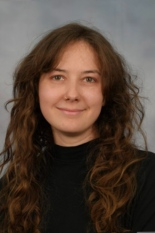Sydney Overton receives Graduate School’s Outstanding Graduate Assistant Award

Sydney Overton, a third-year Ph.D. student in electrical engineering, was selected for the University of Maryland Graduate School’s Outstanding Graduate Assistant Award.
The award recognizes the outstanding contributions that graduate assistants provide to students, faculty, departments, administrative units, and the university as a whole. The Graduate School awards approximately 80 Outstanding Graduate Assistant Awards annually. Award winners receive a credit for mandatory fees during the Spring 2025 Semester.
“It’s always nice to be recognized for my hard work,” Overton said. “I’ve been fortunate to have mentors who provide counsel and advocate for me at the department, college, and university levels. This award is incredibly rewarding and speaks to my dedication to both teaching and research as a graduate student. Every graduate student I know is committed to their teaching, research, and coursework, so to be recognized among so many incredible graduate assistants is humbling. I’m very grateful.”
Overton conducts research in the MEMS Sensors and Actuators lab (MSAL) under Herbert Rabin Distinguished Chair in Engineering and Fischell Institute Fellow Reza Ghodssi.
At MSAL, Overton is designing an ingestible capsule that deploys sensors to measure gut serotonin concentrations. Her work centers on the gut-brain axis (GBA) and the development of tools to better understand specific pathways and biomarker dynamics. By taking a systems integration approach, she aims to create a new study platform to further research on the GBA—an effort that aligns with her longstanding interest in engineering solutions to medical challenges.
“I’m particularly interested in this research because of the physiological implications of the GBA, which plays a role in gut and neurological diseases,” Overton said. “The goal of my research is to help unravel some of the specific pathways within the GBA to improve our understanding of these diseases and potential treatments.”
More information can be found on the UMD FIschell Institute News (26 - February / 2025)